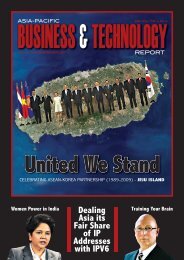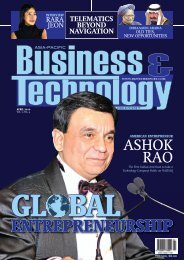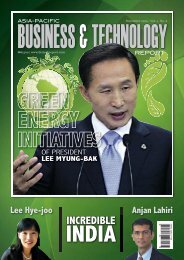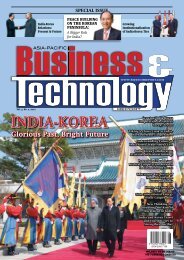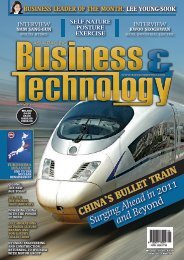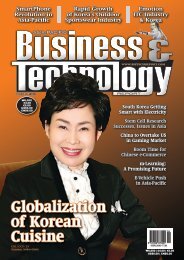GreeN Growth - Asia-Pacific Business and Technology Report
GreeN Growth - Asia-Pacific Business and Technology Report
GreeN Growth - Asia-Pacific Business and Technology Report
- No tags were found...
You also want an ePaper? Increase the reach of your titles
YUMPU automatically turns print PDFs into web optimized ePapers that Google loves.
sportswww.biztechreport.comBy Donald KirkThe crowds watchingthe news at twentyminutes after midnightin the heart of SouthKorea’s “snow country”exploded in cheers <strong>and</strong>tears like a fizzy blast ofchampagne bursting from afreshly uncorked bottle.fstockfoto | Dreamstime.comKorea’s Winter Wonderl<strong>and</strong>Overjoyed at Prospectof Hosting 2018 Olympics“I had to cry when I heard,” said KohSeung-hee in the lobby of a luxury hotel inSouth Korea’s winter wonderl<strong>and</strong>. “We havebeen waiting so long.”All the waiting reached a crescendo veryearly in the morning of July 7 when thepresident of the International Olympic Committee,Jacques Rogge, after the vote by theIOC in Durban, South Africa, held up a paperwith the single word, “Pyeongchang.”The partying extended from the base ofthe long-jump slope in Pyeongchang’s Alpensiaresort to the town square in the centerof the district of hills <strong>and</strong> valleys aboutthree hours east of Seoul. The sense of quickrelief from all the built-up tension mingledwith the wild anticipation of Korea finallyhosting the Winter Olympics nearly sevenyears from now after having lost out on twoprevious bids.“All people in Korea want to hold the winterOlympics in Korea,” said Chang Ju-ree,who runs a small hotel with her husb<strong>and</strong>,Kim Yong-tae, a short drive from the Alpensiaresort, past verdant golf courses <strong>and</strong> skislopes. More than national pride infuses the46,000 or so people in the towns <strong>and</strong> villagesnestled in the hills here as they anticipate asteady rise in business during the run-up tothe Olympics. “Everyone is so very glad,” saidChang. “This can be a good opportunity. Weare going to open a restaurant on the firstfloor of our hotel. We want to offer rental ofskis <strong>and</strong> snow boards – <strong>and</strong> maybe karaoke.”Husb<strong>and</strong> Kim Yong-tae sees the WinterOlympics as reversing setbacks in the pastfew years which have occurred amid economichard times <strong>and</strong> concerns that maybethe games would never come here. “Developmenthas been slowing down,” he said.“Now it should grow more <strong>and</strong> more. I expectbig business from this year.” The nameof the hotel, he <strong>and</strong> his wife point out, isGreen <strong>and</strong> Blue, green for the surroundingcountryside, blue for the sea, another twentymiles or so to the east where the plan is tobuild six ice rinks in the port city of Gangneungfor the Olympic ice sports -- figure skating,hockey <strong>and</strong> curling.Just maybe, Kim observed happily, theprospect of an Olympic bonanza will lureone of the big foreign hotel chains into ajoint venture with his establishment, fundingexpansion as a sure investment in a regionthat yearns for recognition as a majordestination for winter sports enthusiastsfrom <strong>Asia</strong> as well as the U.S. <strong>and</strong> Europe.That kind of incentive on a micro levelpermeates the dreams of Korea’s leaders,politicos <strong>and</strong> businesspeople for turningthe 2018 Winter Olympics into the basis forseveral billion dollars worth of investmentin a region where some of the Korean War’sbloodiest battles were fought some 60 yearsago. Among the costliest schemes will beconstruction of a high-speed railroad, piercingthe mountains with long tunnels, <strong>and</strong>linking the capital to the east coast in an engineeringfeat that should reduce the timeit takes to get to Pyeongchang from Seoulto less than an hour. That’s all in the visionof South Korea’s President Lee Myung-bak,the conservative who rose to power from hiscorporate origins as the spear-carrying chairmanof Hyundai Engineering <strong>and</strong> ConstructionCo., the original “mother company” ofthe Hyundai empire.President Lee, his popularity dwindlingamid upwards of 20 percent unemploymentamong Korea’s restive youth in the 20-to-30-year-old age bracket, personally ordered thefull-scale offensive. He clearly believed heneeded to wrest the winter games into Korea’spossession after failures in the last twoattempts, first when Vancouver got it for the2010 games <strong>and</strong> then in a near-miss to theRussian Black Sea city of Sochi, host of the2014 games. In that spirit Lee led a delegationof several hundred aides <strong>and</strong> businesspeopleto Durban, all of them delegated tobuttonholing specific contacts, talking theminto the need to bring the Winter Olympicsto “new horizons.” That phrase is now theslogan for the games, which will be the firstWinter Olympics ever held in any <strong>Asia</strong>ncountry besides Japan, which hosted themin Sapporo in 1972 <strong>and</strong> in Nagano, in theJapanese Alps, in 1998.A stern taskmaster, Lee smiled publiclywhile driving his aides to distraction in thefinal days, hours <strong>and</strong> minutes before the votingby most of the 106 members of the InternationalOlympics Committee. He was hardeston himself, rehearsing again <strong>and</strong> againfor his final plea in Durban. “There shouldbe no mistake until the end,” he was quotedby Yonhap, the South Korean news agency,as telling aides. “Sincerity moves heaven.Let’s move heaven.”One sure vote was that of Samsung chairmanLee Kun-hee, South Korea’s wealthiestman. As a member of the IOC, ChairmanLee was frequently seen at President Lee’sside. His influence is assumed to have wonwidespread support among representativesof companies with which Samsung, by farKorea’s biggest conglomerate, or chaebol,does business. In the end, of course, the Koreanmachine did so remarkably well thatthe final tally was basically no contest. Pyeongchanggot 63 votes against 25 for Munich,seen until the final days as almost an evencontender, while Annecy in France, never reallyviewed as a threat, won only 7.The third time was a charm, it seemed,for a district that’s emerged over the pastgeneration as a serious destination for wintersports lovers. For the people of Pyeongchang,the joy of success in competitionwith bids from two of winter sports’ primarydestinations, Germany <strong>and</strong> France, was proofof their own importance in a society drivento prove it’s up there with the big powersof western Europe <strong>and</strong> <strong>Asia</strong>. Now people aretalking about all they will do to prepare forthe influx of visitors before the games beginnearly seven years hence. “We will welcomeforeigners like members of our family,” saidone woman. “We will make Pyeongchang acity of which we can be proud.Just what kind of welcome foreigners willreally get, of course, is not clear. An Americanschoolteacher from Kansas, whom I metin a coffee shop the morning after the greatvictory celebrations, said she rarely communicateswith anyone outside the two schoolswhere she’s been teaching for the past year.She does ski, she told me, but chooses tospend winter weekends among the brightlights of Seoul, a three-hour bus ride to thewest, rather than take to the nearby slopes,where she’s never ventured. Next year, sheadds, she’s looking forward to teaching inContinued from Page 41that revolves around the Internet is raisingstronger anxieties for many individuals today.Nearly 40 million people’s accounts areregistered for online access, compared tojust 6.4 million in 2000, according to latestfigures from the British Bankers’ Association.Internet users in Malaysia have beenwarned not to reveal their bank account ortelephone numbers on social networkingwebsites as they could end up being thevictims of hackers. Using the Internet hasmoved from a stage of risky to dangerouswith such data hacking incidences. Thisurges us to ponder whether the motivationis intelligence, cyberwar, extortion, businessdisruption, or simply for the sake offun. In any case, attackers are certainly havingan upper h<strong>and</strong>.For the people of Pyeongchang, the joyof success in competition with bids fromtwo of winter sports’ primary destinations,Germany <strong>and</strong> France, was proof oftheir own importance in a society drivento prove it’s up there with the big powersof western Europe <strong>and</strong> <strong>Asia</strong>.With data security crimes burgeoning,every country is planning to protect theirusers by adopting certain measures withthe aim of improving cyber security. Forinstance, the Economy, Trade <strong>and</strong> IndustryMinistry in Japan is said to be planning toestablish a network of domestic firms <strong>and</strong>organizations to share information aboutattacks on their online computer systems.Under such circumstances, the onlinesecurity l<strong>and</strong>scape has been witnessing acontinuous change. The Internet is filledwith viruses, spyware, hackers, rootkits,<strong>and</strong> identity thieves. A new security dangeremerges every day. Users are warned to staya step ahead of security threats with a reliable<strong>and</strong> safe Internet security suite. Traditionally,this involved getting an anti-virusprogram, an anti-spyware program, <strong>and</strong> aa much larger city where “at least there’ssomething to do.”For Pyeongchang, the most intimidatingvisitors are likely to be not so muchthe foreigners as the thous<strong>and</strong>s of officials,businesspeople, <strong>and</strong> entrepreneurs. They’vebeen descending on the area for years, buildingvenues <strong>and</strong> accommodations to the pointat which Pyeongchang could successfullycompete against Germany’s Munich <strong>and</strong> Annecyin France. Now they’ll be coming in stilllarger numbers as construction of facilitiesfor athletes <strong>and</strong> visitors begins to surge in afrenzy of nationalist <strong>and</strong> cultural pride.For a country that’s constantly comparingitself with long established global powersin a game of rankings, whether it comesto gross domestic product or exports or academicachievement, the selection of Pyeongchangwas an ultimate accolade. The finaltest of success, however, will be whetherPyeongchang can emerge as a major wintersports destination not just for Koreans butfor foreigners, who rarely make it their firstchoice over just about anywhere else fromNorth America to Europe.Kim Yeon-ho, owner of a constructioncompany, asked foreigners, “Please give usyour support,” as Pyeongchang began to preparefor its place in Olympic history. In theend, the emotional drive, the national desireto prove Korea’s st<strong>and</strong>ing as a global power,made the difference. “We’re so happy. We’vebeen preparing for this for ten years,” saidCho Yang-ho, talking on Korean TV networksin Durban. “The biggest factor is each<strong>and</strong> every citizen gave us support, so I didn’tfeel it was so difficult. I never felt pessimisticabout anything.” Soh Min-kyung, whoruns a restaurant, spoke of how sad it wouldhave been to lose the bid. “It would be badfor Korea, bad for Koreans,” she said. “Thisis a great thing. All Koreans are extremelyhappy.”If Koreans can unite in pride over thechoice of Pyeongchang, however, they’restill too deeply divided as to imagine thatthe 2018 Winter Olympics will have muchto do with covering the fissures in Koreansociety. President Lee faces rising discontentover policies that favor the chaebol while theopposition Democratic Party exploits suchissues as student protests against tuition<strong>and</strong> the intractable problem of unemploymentamong young people in the run-up tothe next presidential election in December2012. Lee, under Korea’s “Democracy Constitution,”in force since massive protestsshook the regime in June 1987, cannot runfor a second five-year term but would loveanother conservative to pick up the baton.The leader of the Democratic Party may nothave real answers for unemployment, butis sure to dem<strong>and</strong> resumption of talks withNorth Korea, which do not appear likely untilLee steps down in early 2013.For now, however, that kind of politickingappears distant if not irrelevant in theoutburst of unadulterated joy over gettingthe 2018 Winter Games. The responsesamong Koreans were universal: “A dreamcome true,” “I’m so happy,” were on everyone’slips -- other than, “I’m speechless,” thewords of those to whom “a dream” hardlyseemed strong enough to convey the emotionsof the moment. A-Pfirewall together, yet today’s Internet securitysuites encompass much more as technologyitself is helping hackers to penetrate<strong>and</strong> attack no matter what kind of securityis put in place.“There absolutely needs to be a movementto object-centered security,” said Prem Iyer,director of the information security practiceat Iron Bow Technologies, a proven leader inproviding intelligent, full-lifecycle technologysolutions for government <strong>and</strong> industry.“Even if I lose data from my own control,I still need to be in the position of implementingpolicies on that data <strong>and</strong> to ensurethat it’s not being viewed by anyone thatdoesn’t have a need to know,” he added.However, a proactive method to trace<strong>and</strong> track the source of the threats is yet tobe identified. A-P46 | A-P BUSINESS & TECHNOLOGY REPORTA-P BUSINESS & TECHNOLOGY REPORT | 47



